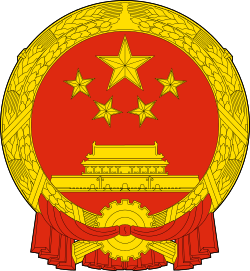Chen Muhua
| Chen Muhua | |
|---|---|
| 陈慕华 | |
| Chairwoman of the All-China Women's Federation | |
|
In office 1988–1998 | |
| Preceded by | Kang Keqing |
| Succeeded by | Peng Peiyun |
| Governor of the People's Bank of China | |
|
In office 1985–1988 | |
| Preceded by | Lü Peijian |
| Succeeded by | Li Guixian |
| State Councilor of China | |
|
In office 1982–1988 | |
| Premier | Zhao Ziyang |
| Vice Premier of China | |
|
In office 1978–1982 | |
| Premier | Zhao Ziyang |
| Personal details | |
| Born |
1921 Qingtian County, Zhejiang, China |
| Died |
12 May 2011 (aged 90) Beijing, China |
| Political party | Communist Party of China |
| Spouse(s) | Zhong Yi |
| Children | 4 daughters |
Chen Muhua (Chinese: 陈慕华; 1921 – 12 May 2011) was a Chinese Communist revolutionary and politician who served as Vice Premier, State Councilor, Minister of Foreign Economic Relations and Trade, Commissioner of the National Family Planning Commission, Governor of the People's Bank of China, and Chairwoman of the All-China Women's Federation. She was an alternate member of the Politburo of the Communist Party of China, one of the few women to have entered China's top decision-making body.
Early life
Chen Muhua was born in 1921 in Qingtian County, Zhejiang Province, during the Republic of China period. Her uncle was a Kuomintang air force official who helped her complete high school education, but she was sympathetic to the Communist cause and went to Yan'an, the wartime base of the Communists, in 1938, after the outbreak of the Second Sino-Japanese War. She told her mother that she would return in six months, but was unable to go home until the end of the war in 1945, when her mother had already died.[1]
Chen studied military science at the Counter-Japanese Military and Political University in Yan'an, and joined the Communist Party of China. Her teachers included Zhu De, Chen Yun, and Otto Braun (known in China as "Li De"). During the Yan'an Rectification Movement, she was subject to constant investigation because of her Kuomintang uncle, despite being pregnant. She was forced to give away her daughter when she was born in 1943.[1] The investigation ended only with the intervention of Zhou Enlai. During the Chinese Civil War, she worked a number of jobs in the Rehe Military Region.[1]
People's Republic of China
After the founding of the People's Republic of China in 1949, Chen worked in economic areas, serving as head of the Railway and Long-term Planning offices of the State Planning Commission's Transport Bureau in the 1950s.[1] In the 1960s, she worked in the Foreign Economic Relations General Liaison Office, where she was in charge of China's foreign aid to African countries.[1][2]
During the Cultural Revolution, Chen was labeled a "capitalist roader", partly because she had suggested that cadres dealing with foreign countries should learn foreign languages. There was also rumour that Chen Cheng, the Kuomintang Vice-President of the Republic of China on Taiwan, was her uncle. Chen Muhua's brother was persecuted to death in Heilongjiang Province.[1]
Chen was politically rehabilitated and appointed Deputy Minister of Foreign Economic Relations and Trade in 1970, reporting directly to Premier Zhou Enlai.[1]
In 1978, Chen became a vice premier (and vice premier-level state councilor after 1982), the highest non-honorary government position achieved by a woman at the time.[1] When China initiated its family planning policy in the early 1980s, she was put in charge of the National Family Planning Commission.[2] She also served as Minister of Foreign Economic Relations and Trade, and implemented policies that encouraged export, which grew to over US$30 billion. In 1985, she was appointed Governor of the People's Bank of China (PBOC), China's central bank. Under her leadership, China became a member of the Asian Development Bank (ADB) in 1986. She served as a board member of the ADB, as well as the African Development Bank.[1] After leaving her PBOC post in 1988, she was appointed chairwoman of the All-China Women's Federation.[1]
Chen Muhua was an alternate member of the Politburo of the Communist Party of China, one of the few women to have entered China's top decision-making body. Although Jiang Qing, Ye Qun, and Deng Yingchao also became Politburo members, they were all wives of China's top leaders and did not hold executive positions.[1]
Family
In 1940, Chen married Zhong Yi (钟毅), a graduate of Harbin Institute of Technology, in Yan'an. Zhong served as a military commander in the 1960s, but retired early due to poor health. They had four daughters. She was forced to give away her newborn second daughter in 1943, when she was under investigation during the Rectification Movement. After 1949, Chen spent decades searching for the daughter, until they were finally reunited in 1975.[1]
Death
On 12 May 2011, Chen Muhua died of an illness in Beijing, aged 90. President Hu Jintao and all the members of the Politburo Standing Committee attended her funeral. She was eulogized as a "excellent party member, a long-tested fighter of the Communist cause, a proletarian revolutionary, an outstanding leader in the realm of economic affairs and women and children affairs."[3] She was buried at the Babaoshan Revolutionary Cemetery.[2]
References
- 1 2 3 4 5 6 7 8 9 10 11 12 Lee, Lily Xiao Hong; Stefanowska, A. D. (2003). Biographical Dictionary of Chinese Women. M.E. Sharpe. pp. 69–71. ISBN 978-0-7656-0798-0.
- 1 2 3 Sarah Wang (20 May 2011). "Former Vice Premier of China Chen Muhua Dies". All-China Women's Federation.
- ↑ "陈慕华同志遗体在京火化". Sohu (in Chinese). May 18, 2011.
External links
- Chen Muhua's memorial page on People's Daily (Chinese)
